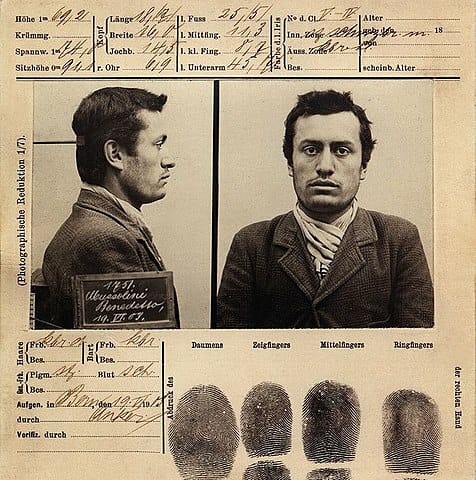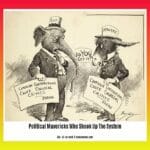It might seem paradoxical, but before his reign as the brutal dictator of Italy, Benito Mussolini briefly stood at the head of a classroom rather than a political party. This period, before his path led him to establish fascism in Italy, offers a fascinating glimpse into the man before the myth. Let’s unravel the intriguing transformation of Benito Mussolini from a disciplinarian educator to the ruthless dictator known as “Il Duce.”
The Making of a Dictator: Mussolini’s Early Years
To understand Mussolini’s trajectory from teacher to tyrant, it’s essential to examine his early life. Born in 1883 in Predappio, Italy, Mussolini’s upbringing was a blend of intellectual curiosity and rebelliousness.
His father, Alessandro, a blacksmith with strong socialist leanings, instilled in young Benito a passion for political discourse and a disdain for authority. His mother, Rosa Maltoni, a devout Catholic and a school teacher, provided a contrasting influence. Despite a turbulent and often violent schooling, which saw him expelled from multiple institutions, Mussolini displayed academic intelligence, ultimately obtaining a teaching diploma in 1901.
A Brief and Unfulfilling Stint: Mussolini the Teacher
Driven by a combination of his mother’s wishes and the need for employment, Mussolini secured a teaching position in 1902 in Pieve Saliceto, a small town with a socialist administration. Perhaps this environment, resonating with his father’s political beliefs, played a role in his decision.
However, the experience proved to be short-lived and deeply unfulfilling for the ambitious young man. He described his students as “about forty kids, rather meek,” a far cry from the captive audience he would later command on a national stage.
Several factors likely contributed to his departure from the classroom. On a personal level, he found teaching unrewarding, his ambitions stifled by the confines of the profession. Additionally, Italy at the time offered limited opportunities for educators, pushing many young men like Mussolini to seek their fortunes elsewhere.
Seeds of Ambition: From Teaching to Tyranny
His time as a teacher, though brief, offers a unique lens through which to analyze his later transformation. Some historians suggest that his experience in the classroom, particularly his struggles with maintaining discipline and asserting control, might have fueled his desire for power and authority.
Was Mussolini’s later embrace of propaganda and manipulation foreshadowed in his attempts to manage a classroom of restless students? Did his frustration with the limitations of teaching contribute to his embrace of a more dominant, authoritarian leadership style?
While definitive answers remain elusive, exploring these connections adds a layer of complexity to our understanding of Mussolini’s path from educator to dictator.
Who Helped Mussolini? The Rise of Fascism
Mussolini’s shift from socialism to fascism, and his subsequent rise to power, was a complex process, enabled by a perfect storm of internal and external factors:
- Post-War Disillusionment: Italy emerged from World War I deeply dissatisfied with the Treaty of Versailles. The nation grappled with economic turmoil, political instability, and a sense of national humiliation. These conditions created fertile ground for extremist ideologies like fascism, which promised a return to glory and a restoration of order.
- Mussolini’s Transformation: His expulsion from the Socialist Party for supporting WWI proved to be a turning point, pushing him towards a more nationalistic and authoritarian ideology. He capitalized on the widespread discontent, founding the Fascist Party in 1919, drawing support from disillusioned war veterans, middle-class citizens fearful of communism, and nationalists yearning for a return to Italy’s past glory.
- The Black Shirts: This paramilitary wing of the Fascist Party, known for its violence and intimidation tactics, played a crucial role in suppressing opposition and creating an atmosphere of fear. Their brutality effectively silenced dissent, allowing Mussolini to consolidate his power with minimal resistance.
- King Victor Emmanuel III: In 1922, amidst widespread political instability and the looming threat of a fascist coup, the King made the fateful decision to appoint Mussolini as Prime Minister. This act legitimized Mussolini’s authority, granting him a veneer of respectability and paving the way for his dictatorship.
The Power of “Il Duce”: Propaganda and Control
Once in power, Mussolini moved swiftly to establish a totalitarian state. He systematically dismantled democratic institutions, imprisoned political opponents, and imposed strict censorship, effectively silencing any challenge to his authority.
Central to his control was a sophisticated propaganda machine. Mussolini’s regime excelled in manipulating public opinion, utilizing radio, film, and mass rallies to craft a carefully curated image of “Il Duce” — the strong, infallible leader destined to restore Italy to greatness. This title, meaning “The Leader” in Italian, was more than just a nickname; it represented his absolute authority, his dominance over every aspect of Italian life.
The constant use of “Il Duce,” blasted through loudspeakers, plastered across posters, and echoed in carefully scripted speeches, created a cult of personality that permeated Italian society. It instilled a sense of awe, obedience, and fear, making it increasingly difficult for citizens to question his actions or challenge his regime.
The Legacy of Mussolini: Lessons from the Past
Mussolini’s journey from a frustrated school teacher to a dictator who led Italy into a disastrous war serves as a chilling reminder of the seductive nature of power and the devastating consequences of unchecked ambition. His story underscores the fragility of democratic institutions and the importance of vigilance in the face of extremist ideologies.
Understanding Mussolini’s rise, including his brief and often overlooked stint as a teacher, provides valuable insights into the complex interplay of individual psychology, social conditions, and political opportunism that can give rise to authoritarianism. By studying the past, we can hopefully learn from its mistakes and work to prevent history from repeating itself.
Exploring Further:
- Did Mussolini’s Time in the Classroom Shape His Authoritarian Tendencies? While difficult to prove definitively, exploring the potential psychological impact of his teaching experience offers a fascinating area for further research.
- The Untold Story: Mussolini’s Short-Lived Teaching Career and What it Reveals Examining this often overlooked period, gathering firsthand accounts from former students, and analyzing his teaching methods could provide a more nuanced understanding of the man before the myth.
- Mussolini: The Frustrated Teacher Who Found Power Through Propaganda Analyzing the connections between his early experiences with education and his later mastery of propaganda offers a compelling avenue for historical inquiry.
Did you know the Schlieffen Plan failed because the German army was not as prepared as they thought they were? And James Madison greatly feared the problem of factions in democratic governments. You can know more by clicking on the link. I bet you will be surprised to know that the invasion of Okinawa was bigger than D-Day Normandy.
















